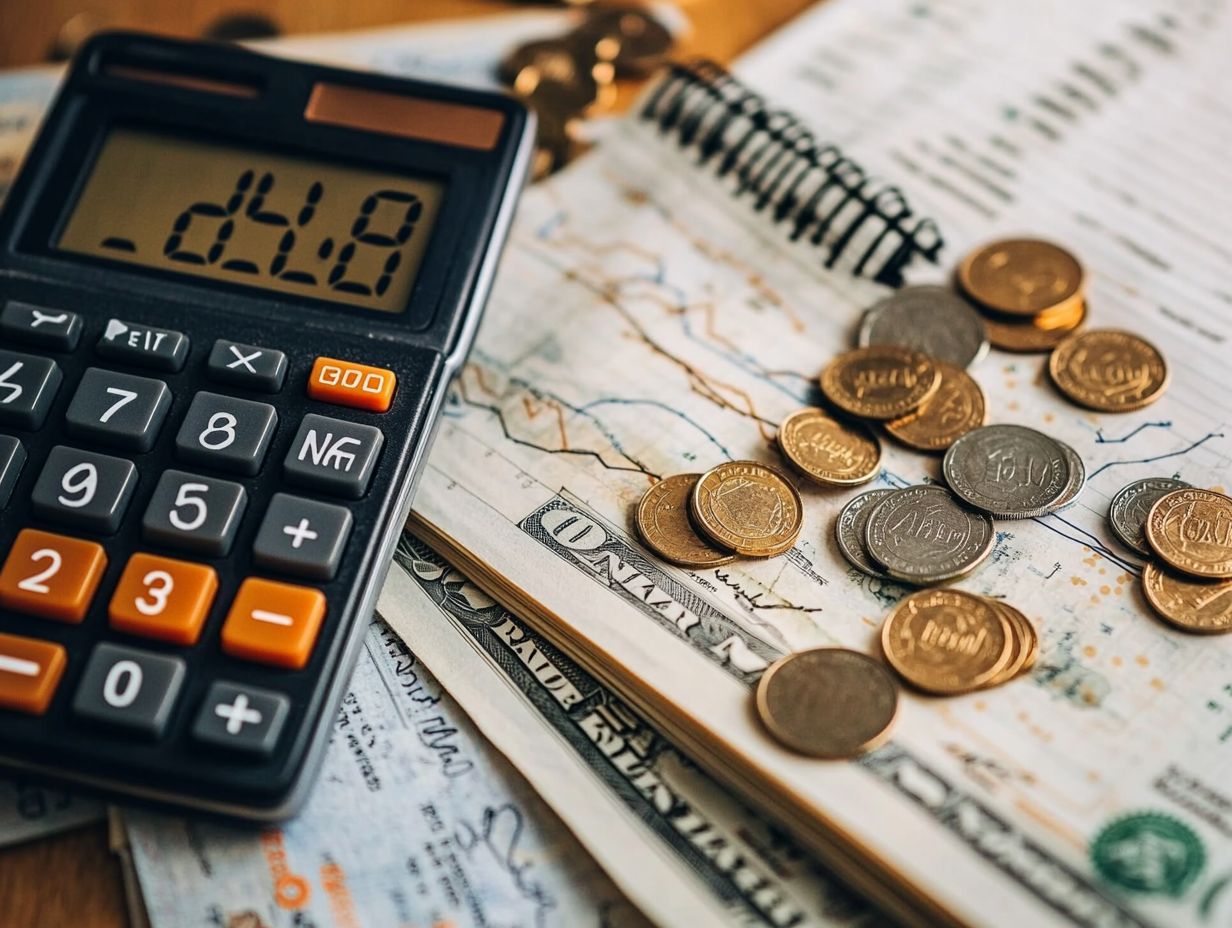What Are the Fees Associated with Crowdfunding?
Crowdfunding is an exciting way to turn ideas into reality.
However, many creators are surprised by the fees involved.
Grasping these costs is essential for optimizing your campaign’s success. From platform fees to payment processing charges, a range of expenses can significantly diminish your funds.
Let s explore the fees involved so you can maximize your campaign s success!
This article covers the various fees associated with crowdfunding, the factors that affect them, and offers practical strategies to reduce these costs. This will ensure your project receives the financial backing it rightly deserves.
Contents
- Key Takeaways:
- What is Crowdfunding?
- Types of Fees in Crowdfunding
- Factors That Affect Crowdfunding Fees
- How to Minimize Crowdfunding Fees
- Frequently Asked Questions
- What are the fees associated with crowdfunding?
- Are there any upfront fees for starting a crowdfunding campaign?
- How much do platform fees typically cost?
- What are payment processing fees and how much do they cost?
- Do I have to pay taxes on the funds raised through crowdfunding?
- Are there any ongoing fees associated with crowdfunding?
Key Takeaways:

Crowdfunding involves various types of fees, such as platform fees, payment processing fees, and investment fees, which can impact the overall cost of your campaign. The size and type of your campaign, as well as the platform and payment method you choose, can all affect the fees associated with crowdfunding.
To minimize crowdfunding fees, consider tips such as choosing a platform with lower fees, setting realistic campaign goals, and offering rewards instead of equity.
What is Crowdfunding?
Crowdfunding serves as a dynamic financial strategy that gives you the power to raise funds for your projects or campaigns by attracting contributions from a diverse group of individuals, often through popular platforms like Kickstarter and Indiegogo.
This innovative approach allows you to engage with backers who are genuinely interested in championing unique ideas, products, or causes. It provides an appealing alternative to traditional funding methods.
By leveraging these platforms, you can effectively present your vision and funding objectives while connecting with a global community that is eager to support new ventures.
Why Are There Fees?
Fees in crowdfunding are critical factors that you must grasp. They can significantly impact the total funds you raise for your campaign. These fees may include platform fees, processing fees, and donor fees, which are essential for the functioning of crowdfunding platforms.
They ensure these platforms can continue to connect backers with innovative projects and provide the services necessary for effective funding. You need to understand these costs before launching your campaign, as they can chip away at your potential earnings.
Platform fees cover your access to the website and its marketing resources, while processing fees are typically charged by companies that handle payments securely for managing transactions. Though less common, donor fees can also emerge, potentially influencing how much a backer chooses to contribute.
These fees aren t just there to uphold the platform s infrastructure; they also promote continuous innovation and enhancements in the services provided, ultimately enriching the experience for both creators and supporters.
Types of Fees in Crowdfunding
Understanding the various types of fees in crowdfunding is crucial for both entrepreneurs and backers. These fees can differ significantly across platforms like Kickstarter and Indiegogo.
Generally, there are three key categories of fees you should be aware of:
- Platform fees
- Payment processing fees
- Investment fees
Each of these fees is integral to the crowdfunding ecosystem and can have a notable impact on the success of your campaign.
Platform Fees

Platform fees are the charges that crowdfunding platforms like Kickstarter and Indiegogo impose on you for the privilege of using their services to launch your campaigns and connect with backers. Typically, these fees hover between 5% and 10% of the total funds you raise, depending on the platform and the specific options you choose for your campaign.
For example, Kickstarter usually takes a flat fee of 5%. Don t forget about those additional payment processing fees that can range from 3% to 5%. This combined deduction can significantly affect the final amount you receive.
On the other hand, Indiegogo may boast lower fees for certain types of campaigns, but it s essential for you to keep an eye out for hidden costs. This variability means you need to carefully assess your platform choice, as higher fees could leave you with a smaller financial cushion to bring your ideas to life.
Payment Processing Fees
When you launch a crowdfunding campaign, you ll encounter payment processing fees that come into play as backers contribute. These fees are essential for securely managing monetary transactions.
Typically, these fees range from 2% to 5% of the total amount pledged. The specific percentage is influenced by the payment processor you choose and the volume of transactions. Third-party payment processors are the unsung heroes of the crowdfunding arena, ensuring smooth and efficient transfers of funds between backers and campaigners.
Platforms like Stripe and PayPal each have different fee structures. These variations can significantly affect the total amount you ultimately receive.
If you raise $10,000 with a 3% processing fee, the actual funds available will drop to about $9,700. This serves as a reminder of how these costs can impact the financial support your project truly benefits from.
Investment Fees
Investment fees often come into play in specific crowdfunding scenarios, especially in equity crowdfunding, where backers receive a share of ownership in the project or company they support.
These fees typically function as a percentage of the total investment raised. They cover essential costs like administration, legal services, and marketing to attract potential investors.
Be aware that legal requirements surrounding these investment fees can vary by jurisdiction. Full disclosure is often necessary to ensure you understand where your money is going.
For both entrepreneurs and backers, these fees can significantly influence funding dynamics. While they may streamline the investment process, they can also eat into the overall returns you might expect.
Unlike standard crowdfunding fees that generally apply to donations or rewards, equity crowdfunding fees can be more intricate. They potentially affect a campaign’s success and the net amount the entrepreneur receives after deductions.
Factors That Affect Crowdfunding Fees
When launching a crowdfunding campaign, consider several factors that can influence the associated fees. These factors ultimately impact your funding potential.
Key elements include the size and type of your campaign, the specific crowdfunding platform you select, and the payment methods your backers use.
Each of these elements plays a significant role in shaping the overall costs you’ll encounter throughout your fundraising journey.
Size and Type of Campaign

The size and type of your crowdfunding campaign significantly influence the fees you may encounter during your fundraising effort.
If you re launching a larger campaign, you ll likely face a more intricate fee structure. This can include various rates and additional charges that smaller projects might not deal with. The complexity often comes from the heightened visibility and scale of larger fundraising efforts.
If your project is creative, the fee percentage may differ from what business ventures incur. This difference reflects the diverse levels of risk and potential returns.
Because of this, carefully assess how these factors will impact your overall funding strategy and budget. Selecting a platform that aligns with your project s unique needs is key to your success.
Platform and Payment Method
The selection of a crowdfunding platform and your choice of payment methods can significantly impact the fees associated with your campaign.
Understanding the fee structures of well-known platforms like Kickstarter, Indiegogo, and GoFundMe is vital for fundraisers. Each site has its pricing models and potential costs that affect your overall earnings.
For instance, Kickstarter imposes a flat fee of 5% on funds raised. However, keep in mind that additional processing fees can vary based on your selected payment method. Indiegogo offers a flexible fee structure, allowing you to choose between fixed and flexible funding options, each with its own fee implications.
Payment methods, such as credit cards and PayPal, often come with processing fees that typically range from 3% to 5%. These fees further affect the actual amount you receive as a campaign creator.
Therefore, analyze not only the platform fees but also how your payment choices can impact your final totals.
How to Minimize Crowdfunding Fees
Minimizing crowdfunding fees can significantly boost the total funds you receive. Effective financial management and smart marketing strategies help reduce the burden of fees, allowing you to retain a larger portion of the funds raised for your projects.
Tips for Reducing Costs
Implementing targeted strategies to reduce costs empowers you as a business owner to successfully manage the often confusing world of crowdfunding fees. Take time to research various crowdfunding platforms to uncover differences in fees associated with each option.
This research not only reveals baseline charges but also highlights any hidden costs that may arise. Engaging in discussions to negotiate better payment processing terms can yield significant savings over time. By managing donor fees effectively, you maximize contributions, allowing you to reach your funding goals with greater efficiency.
Each of these strategic actions can collectively make a substantial impact on the overall budget of your crowdfunding campaign.
Frequently Asked Questions

What are the fees associated with crowdfunding?
The fees associated with crowdfunding can vary depending on the platform and type of campaign. Common fees include platform fees, payment processing fees, and rewards or equity fees.
Are there any upfront fees for starting a crowdfunding campaign?
Most crowdfunding platforms do not charge any upfront fees for starting a campaign. However, there may be costs related to creating and producing rewards or perks for backers.
How much do platform fees typically cost?
Platform fees can range from 3-5% of the total funds raised but can vary depending on the platform. It’s important to research and compare platform fees before choosing a crowdfunding platform.
What are payment processing fees and how much do they cost?
Payment processing fees are charged by the payment processor to handle transactions between backers and the campaign creator. These fees can range from 2-5% of the total funds raised, plus a flat fee per transaction.
Do I have to pay taxes on the funds raised through crowdfunding?
Yes, funds raised through crowdfunding are considered income and may be subject to taxes. It’s important to consult with a tax professional to determine the tax implications of your crowdfunding campaign.
Are there any ongoing fees associated with crowdfunding?
If you offer ongoing rewards or perks, you may face extra costs for fulfilling them. Some crowdfunding platforms may also charge monthly or annual fees for maintaining an active campaign.






